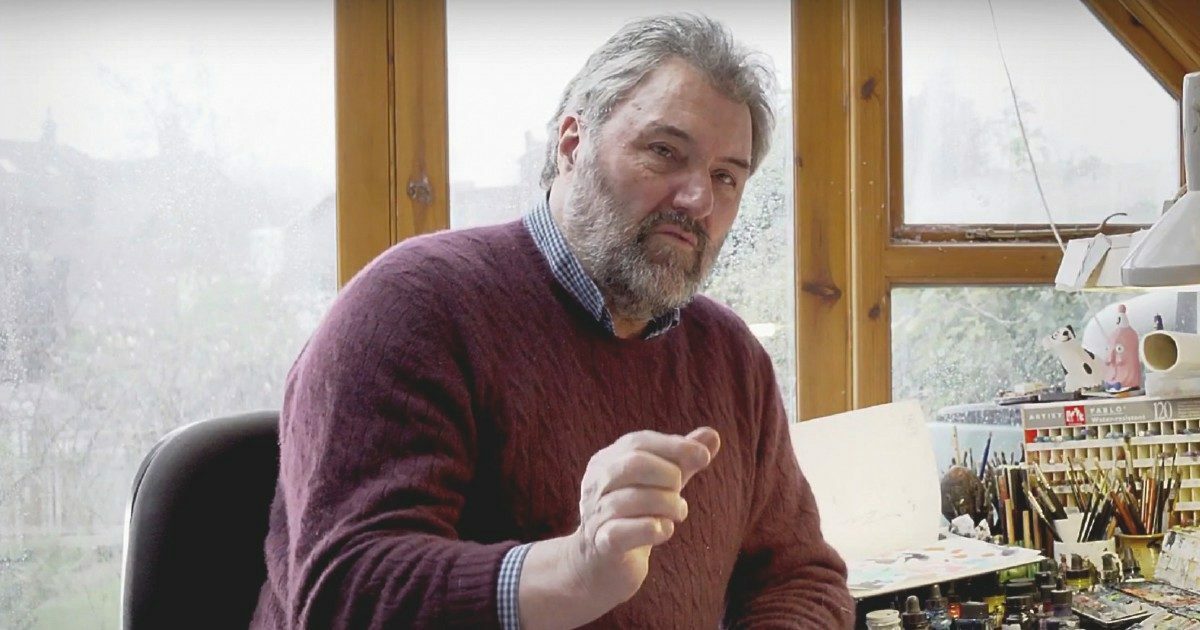France has banned all pro-Palestinian demonstrations. In the United States, law students at Harvard and Columbia universities have been punished for signing statements about Israel’s responsibilities in Gaza. And this week British newspaper The Guardian sacked its political cartoonist, Steve Bell, for a cartoon regarding Benjamin Netanyahu. Bell had been working for the Guardian for the last 42 years. He is an unassuming, straightforward man with a wry sense of humor. Il Fatto Quotidiano sat down for an in-depth interview with him.
Did you expect this?
“Well, I know it’s a difficult subject, and there have been problems in the past. The thing was, they wouldn’t talk, they wouldn’t explain their decision, which was an arbitrary and I think stupid one, they totally misread the cartoon. They misunderstood what I was trying to say, and I think they deliberately misunderstood it, that’s the problem. When that happens, you cannot argue. They would not argue, they would not talk to me, they just laid down the law, that was it. And they were doing this – they’d had the cartoon for hours, I did it very early in the morning, and I would have appreciated the chance to talk it through. I think the reasons they gave for stopping the cartoon were false, and that’s the other problem. They were accusing the cartoon of using anti-Semitic tropes, which is a phrase that often gets wheeled out, when I think they mean they can’t outright call you “anti-Semitic”, but they want to call you a little bit anti-Semitic. So it’s kind of a stupid and insulting idea. The trouble is that the situation is so polarized, and the Guardian seems to put the editorial process into the hands of people who are very one-sided, and almost sectarian in their approach. This is unfortunate. They’ve also become much more rigid in the way they expect me to obey their rules, which they have never been in the past. I mean the Guardian has always been very open, in many ways, relaxed. I’ve had a lot of – they’ve allowed me to do a lot of very good work, without interference”.
Do you believe this has to do with the internal fight in the Labour Party, where there are people siding with Jeremy Corbyn and people siding with centrists and Keir Starmer, and the latter group has been accused of using anti-Semitism allegations as a political weapon?
“I think that’s very true, there is a definite parallel. I think the Guardian has become very close to the Labour Party as the Labour party has become. I have been a member of the Labour Party for a long, long time, but what’s happening in the Labour Party is completely ridiculous. They have aligned themselves with a particular sectarian view of what’s happening in the Middle East. There’s an organisation within the Labour Party called The Jewish Labour Movement, which has strongly pro-Zionist views, and they are dominant at the moment. Keir Starmer has completely given them the run – the things he has been saying are terrible, they’ve been worse in some ways than Rishi Sunak. He’s saying that Netanyahu has the right to starve and deprive people of water, and collectively punish the people of Gaza, which is nonsense. It is against international law, which he knows, he is a lawyer. So Labour has gone mad, I think. But the Guardian has also picked up this kind of thing, because the Guardian is a kind of liberal paper, but it moves towards the right of the Labour Party. A liberal paper should be open to different points of view, and it’s not, that’s the worst of it. The Guardian is trashing its own traditions as a liberal paper”.
Is the war in Ukraine and in Gaza contributing to this extremely rigid stance taken by the Guardian?
“It may be, yes. The Ukraine war has been difficult to deal with. I’ve felt my views are certainly not the mainstream ones of the Guardian. I’m in no way pro-Putin, but I’m skeptical about the pro-war line: we must win, they are going to victory at all costs, which is a kind of nonsense, a fantasy. I’ve managed to negotiate that one. But now it’s back to Israel-Palestine, which is always a difficult, prickly subject to tackle. You have to tackle it openly, and you have to be clear about what are you saying, but the trouble is people will take issue with that”.
We see a lot of crackdown on social networks, on public debate, even on the right to protest. Are you concerned about freedom of expression?
“Very much. That’s very serious isn’t it, in this country. The Home Secretary is a mad, rabid right-winger, and she has said we must clamp down on waving the Palestinian flag, that should be considered a hate crime, which is nonsensical. It’s always the failure to even listen to the arguments on both sides. Both sides have very strong arguments. But the killing of civilians is – nobody believes in the killing of civilians. At the moment, however, one side is sort of implying that there must be further killing of civilians in order to collectively punish one side. It’s a very bleak prospect”.
What is the mission of political cartoon, what is your view of it?
“What’s the mission? Well, the mission is to comment, and to engage in what’s going on. I think for a cartoonist it’s difficult to do the job unless you have some opinion, because you are always expressing opinion. And the exciting thing about cartoon is thinking about what you have to say, because the same issues keep coming round, year in, year out, day in and day out. Politics is endlessly fascinating, and endlessly involving. So if you don’t get involved, you are pretending a kind of God-like detachment, you look down on all these people, and say: politics is a silly game. I don’t see that, I think politics is something you argue about, you mix in with, and there’s a kind of feeling of ‘oh no, let’s be quiet about that, let’s push that to one side, let’s not get too upset about that.’
The mission is to engage, and to explain, and to disturb, and to move, and I think also to use the unique facilities you have as a cartoonist, which is to use imagery, and to explore imagery, and to question what’s happening. The images that come at us every day from the screens, from the TV, from the newspapers, everything, and to use them, comment on them, turn them. Do whatever you can. Use old images too, old art, to make your point, and making your point is the essence. If you can do it amusingly, make somebody have a laugh, that’s good. If you can move people, that’s good. If you can make something beautiful, that’s good too, but sometimes cartoons are ugly too”.
Do you think that the Guardian, by sticking to a rigid interpretation of cartoons, is betraying its mission to be thought-provoking, rather than offering orthodoxies?
“I think that’s true, I agree with every word of that. Unfortunately, that’s the way they have got. It’s not a good development. It doesn’t bode well for them as a newspaper”.
We are witnessing growing calls for censorship, especially on social networks, and even calls to stop the right to protest, even from the left, which has traditionally been on the side of freedom of expression. Should art and political cartoons be totally free, or should they accept certain limitations because the old enemies, like anti-Semitism, men who hate women, religious fanatics, are always ready to exploit freedom of expression to further their agendas?
“I think journalists, columnists should be free to comment, but obviously you have to think about what you are saying. You don’t just blow out the first thing that comes into your head, you consider what you are saying. That’s difficult. And you need to do it. Standards, what people expect, what people will accept, change over time. I know, there are certain things I couldn’t do now for very good reasons, they’re considered offensive: you can’t use certain racist language. That’s understandable, and I agree with that. So you accept this kind of, you might call it “strictures” on your freedom of speech. But you think about it, and if you feel the need to, you argue back against it. And that’s I suppose what I’ve been doing about this business of anti-Semitic tropes. I’ve been trying to argue back, with not much success, I must admit (laughing). But I think the point has to be made that if something is anti-Semitic, it’s anti-Semitic, and anti-Semitic is a serious charge, it’s not something to be tossed around like confetti, and applied and used to frighten people as well. The trouble is, when you talk up the hate, what people would describe as Jew hatred, it makes a very tiny minority very nervous, which is understandable. Because Jews are in a very small minority, and I quite understand why they feel under attack. But when you cast lots and lots of false charges about it, it makes the situation worse, it doesn’t help it. That’s my simple argument, which a lot of people probably disagree with, and think is offensive, but I’ve got to try”.

